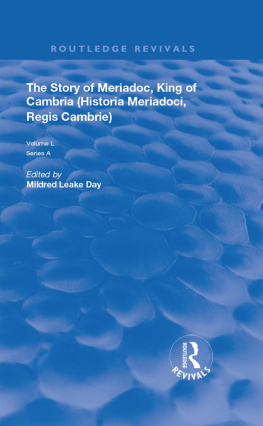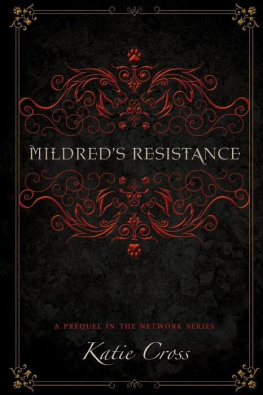Routledge Revivals
The Story of Meriadoc, King of Cambria
The Story of Meriadoc, King of Cambria
(Historia Meriadoci, Regis Cambrie)
Volume 50
Series A
Garland Library of Medieval Literature
Edited and Translated by
Mildred Leake Day
First published in 1988 by Garland Publishing, Inc.
This edition first published in 2019 by Routledge
2 Park Square, Milton Park, Abingdon, Oxon, OX14 4RN
and by Routledge
52 Vanderbilt Avenue, New York, NY 10017, USA
Routledge is an imprint of the Taylor & Francis Group, an informa business
1988 by Mildred Leake Day
All rights reserved. No part of this book may be reprinted or reproduced or utilised in any form or by any electronic, mechanical, or other means, now known or hereafter invented, including photocopying and recording, or in any information storage or retrieval system, without permission in writing from the publishers.
Publishers Note
The publisher has gone to great lengths to ensure the quality of this reprint but points out that some imperfections in the original copies may be apparent.
Disclaimer
The publisher has made every effort to trace copyright holders and welcomes correspondence from those they have been unable to contact.
A Library of Congress record exists under ISBN:
ISBN 13: 978-0-367-19527-4 (hbk)
ISBN 13: 978-0-429-20294-0 (ebk)
The Garland Library of Medieval Literature
General Editors
James J. Wilhelm, Rutgers University
Lowry Nelson, Jr., Yale University
Literary Advisors
Ingeborg Glier, Yale University
William W. Kibler, University of Texas
Norris J. Lacy, University of Washington
Giuseppe Mazzotta, Yale University
Fred C. Robinson, Yale University
Aldo Scaglione, University of North Carolina
Art Advisor
Elizabeth Parker McLachlan, Rutgers University
Music Advisor
Hendrik van der Werf, Eastman School of Music
The Story of Meriadoc, King of Cambria
(Historia Meriadoci, Regis Cambrie)
edited and translated by
MILDRED LEAKE DAY
Volume 50
Series A
GARLAND LIBRARY OF MEDIEVAL LITERATURE
1988 Mildred Leake Day
All rights reserved
LIBRARY OF CONGRESS
Library of Congress Cataloging-in-Publication Data
Historia Meriadoci, Regis Cambrie. English.
The Story of Meriadoc, King of Cambria = Historia Meriadoci, Regis Cambrie / edited and translated by Mildred Leake Day.
p. cm. (Garland library of medieval literature ; v. 50. Series A)
Translation of: Historia Meriadoci, Regis Cambrie.
Bibliography: p.
ISBN 0824084799
1. Meriadoc (Legendary character)Romances. 2. Arthurian romances. 3. Romances, Latin (Medieval and modern)Translations into English. 4. Romances, EnglishTranslations from Latin (Medieval and modern). I. Day, Mildred Leake, 1929 II. Title. III. Series: Garland library of medieval literature ; v. 50.
PA8330.H75E51988
Printed on acid-free, 250-year-life paper
Manufactured in the United States of America
For all my family my parents Howard and Marjory Leake my sons and daughters, their husbands and wives Marjory and Nelson Cooper, Jim and Cynthia Day, Susan and Karl Kling, Howard and Sharon Day Roger and Jodie Day my grandchildren Crystal Day, Wesley Day, Sarah Cooper, David Kling and my husband Jim
Preface of the General Editors
The Garland Library of Medieval Literature was established to make available to the general reader modern translations of texts in editions that conform to the highest academic standards. All of the translations are originals, and were created especially for this series. The translations attempt to render the foreign works in a natural idiom that remains faithful to the originals.
The Library is divided into two sections: Series A, texts and translations; and Series B, translations alone. Those volumes containing texts have been prepared after consultation of the major previous editions and manuscripts. The aim in the editing has been to offer a reliable text with a minimum of editorial intervention. Significant variants accompany the original, and important problems are discussed in the Textual Notes. Volumes without texts contain translations based on the most scholarly texts available, which have been updated in terms of recent scholarship.
Most volumes contain Introductions with the following features: (1) a biography of the author or a discussion of the problem of authorship, with any pertinent historical or legendary information; (2) an objective discussion of the literary style of the original, emphasizing any individual features; (3) a consideration of sources for the work and its influence; and (4) a statement of the editorial policy for each edition and translation. There is also a Select Bibliography, which emphasizes recent criticism on the works. Critical writings are often accompanied by brief descriptions of their importance. Selective glossaries, indices, and footnotes are included where appropriate.
The Library covers a broad range of linguistic areas, including all of the major European languages. All of the important literary forms and genres are considered, sometimes in anthologies or selections.
The General Editors hope that these volumes will bring the general reader a closer awareness of a richly diversified area that has for too long been closed to everyone except those with precise academic training, an area that is well worth study and reflection.
James J. Wilhelm
Rutgers University
Lowry Nelson, Jr.
Yale University
Contents
Plate 1. The opening folio of Historia Meriadoci Regis Cambrie in British Library Cotton Faustina B vi, f.1. (Reproduced by permission of the British Library.)
Date and Authorship
Historia Meriadoci regis Cambrie, The Story of Meriadoc, King of Cambria is about a prince of the kingdom of Cambria (preSaxon Wales) who, after surviving an attempted assassination by his uncle, fights as a young knight in the cause of royal justice. With Arthurs help he brings his usurping uncle to trial for the murder of his father. As Arthurs champion in three judicial duels, he not only defeats the contending knights, but he acts to prevent Arthur from unjust acquisition of their land. Then, laying aside his reign in Cambria in favor of his twin sister and her husband King Urien, he takes the position of a mercenary in the service of the Emperor of the Alemanni in order to bring peace to the warring realms of Europe for war is no more than a judicial duel between kings and, like the judicial duels fought in Arthurs court, not a system of justice but a contest of power. But Meriadoc is compromised by his position as a mercenary, and although he defeats the King of the Land From Which No One Returns and rescues the Emperors only daughter, he falls victim to the Emperors political necessity. In the end, he must act on his own in the cause of justice; and it is the Emperors enemy, the King of Gaul, who finally grants Meriadoc his just reward.
















